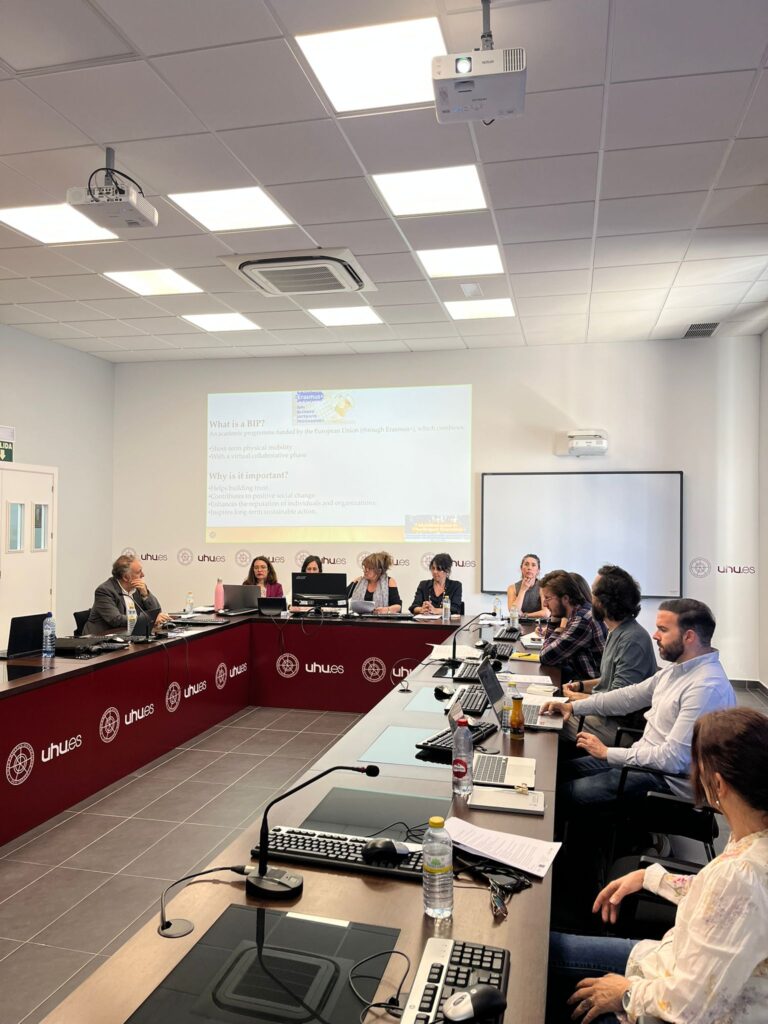The University of Huelva recently hosted the international symposium “Multiliteracies for Plurilingual Societies: Dialogues for Sustainable Communication.” This hybrid-format event, held in both English and Spanish, brought together participants from around the world—France, Canada, the USA, Belgium, Slovakia, Ireland, Iran, Spain, Switzerland, and Hungary—both in person and online.
The symposium marked the conclusion of the research project “Multiliteracies for At-Risk Adults Learning an Additional Language,” funded by the Spanish Ministry of Science and Innovation. The project was led by Dr. María Carmen Fonseca, Full Professor in the Department of English Philology at the University of Huelva.

The opening session featured Dr. Fernando Rubio, Director of Language Policy at the University of Huelva, along with Drs. Analí Fernández and Carmen Toscano, the main organizers of the event. Dr. Rubio emphasized the vital role of language policy in academic, cultural, and social development. He highlighted the importance of fostering language learning and intercultural bridges to create more inclusive and opportunity-rich societies. He reaffirmed the University of Huelva’s commitment to promoting language acquisition and intercultural competence, including a deeper appreciation of one’s own language and culture.
Dr. Fonseca then spoke about the importance of creating spaces for dialogue around multiliteracies in plurilingual societies. In today’s global context—where intercultural communication, non-violent dialogue, cooperation, problem-solving, critical thinking, flexibility, and new literacies are essential—this symposium offered a timely and meaningful platform. With speakers from 18 national and international universities, it was a unique opportunity to reflect on how our increasingly multicultural and technologically driven world demands action-oriented, plurilingual education that fosters global competencies.
She stressed that critical thinking and the active participation of all voices in the classroom are key to building sustainable communication across diverse backgrounds. This aligns with the pedagogical theory of multiliteracies, which encourages learners to engage through multiple modes and channels of communication.
The symposium featured several panels focused on two main themes:
- Language learning for adult migrants in host countries
- Initial and ongoing training for modern language teachers
Each panel included presentations of research findings followed by dynamic discussions moderated by experts in the field.
A highlight of the event was the keynote participation of Dr. Susan Holloway (University of Windsor) and Dr. Patricia Gouthro (Mount Saint Vincent University), both distinguished Canadian scholars. Their internationally recognized work has earned them accolades such as the David Jones Award for Best Research Paper in the Arts (SCUTREA, UK) and the Faculty Research Merit Award at Mount Saint Vincent University. Their recent research, showcased on the Multiliteracies Project website, offers compassionate and holistic approaches to additional language learning—valuable insights for researchers, educators, and policymakers worldwide.
The symposium concluded with a powerful message: learning a language beyond one’s mother tongue opens doors to new worlds, new ways of thinking, and greater mental flexibility. It can also serve as a liberating force, empowering individuals—especially migrants—to become active, democratic citizens. By cultivating ethnocultural openness, we can build more sustainable, inclusive, and plurilingual societies.
